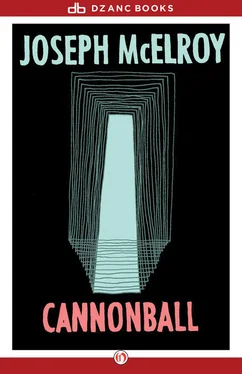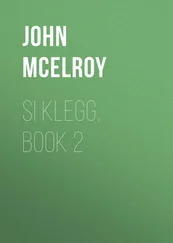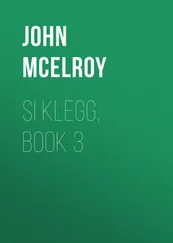Joseph McElroy - Cannonball
Здесь есть возможность читать онлайн «Joseph McElroy - Cannonball» весь текст электронной книги совершенно бесплатно (целиком полную версию без сокращений). В некоторых случаях можно слушать аудио, скачать через торрент в формате fb2 и присутствует краткое содержание. Год выпуска: 2013, Издательство: Dzanc Books, Жанр: Современная проза, на английском языке. Описание произведения, (предисловие) а так же отзывы посетителей доступны на портале библиотеки ЛибКат.
- Название:Cannonball
- Автор:
- Издательство:Dzanc Books
- Жанр:
- Год:2013
- ISBN:нет данных
- Рейтинг книги:5 / 5. Голосов: 1
-
Избранное:Добавить в избранное
- Отзывы:
-
Ваша оценка:
- 100
- 1
- 2
- 3
- 4
- 5
Cannonball: краткое содержание, описание и аннотация
Предлагаем к чтению аннотацию, описание, краткое содержание или предисловие (зависит от того, что написал сам автор книги «Cannonball»). Если вы не нашли необходимую информацию о книге — напишите в комментариях, мы постараемся отыскать её.
continues in McElroy's tradition of intricately woven story lines and extreme care regarding the placement of each and every word. A novel where the sentences matter as much as the overall story.
Cannonball — читать онлайн бесплатно полную книгу (весь текст) целиком
Ниже представлен текст книги, разбитый по страницам. Система сохранения места последней прочитанной страницы, позволяет с удобством читать онлайн бесплатно книгу «Cannonball», без необходимости каждый раз заново искать на чём Вы остановились. Поставьте закладку, и сможете в любой момент перейти на страницу, на которой закончили чтение.
Интервал:
Закладка:
But that name — why, it was “ Storm ” Umo had heard phoning Dad’s somehow- not-turned-off cell at the pool! Stom , Umo said; “Stom”? I asked. Wind, rain, thunder, lightning, flood , Umo said the words; was he kidding, and the language game in his hands? “Oh Storm ,” I said, and before long had understood it was the man’s first name (pool money, I thought, but also the guy who wrote speeches for others). How long ago that phone call? And maybe I with the best will in the world, war-bound, had done the drifting.
I had resolved to enlist. A long-standing impulse, and my secret. I am standing on the beach and my sister’s boyfriend has stomped off somewhere, a kid. I am standing behind her, my hands on her shoulders, one hand comes up to touch mine and draws it down an inch or two. Time to go. Do I have the sequence screwed up? Prophetic. Touching her, you see things. It is months later. And I think of sending Umo a shot from the outskirts of an ancient Middle East city, of music was how I thought of it, sand in my eyes that windy day of the future — an Afro-American GI, I imagined the scar down his cheek, earphones in hand, one ear mutilated, listening lost in concentration to “Let There Be Rock”; I would send it to Cheeky for Umo instead in case she knew where he was, and I had a picture in my mind of his license plate: a gray whale’s fluke prophetically sinking into the sea. And some rowdy moments at a party, some words we’d had.
I have said Faith. My mother’s I might mean, or that we were a family. And her sister’s, who with my uncle joins this staggered history from a hopeless angle. They followed Sumo wrestling in its traditional Japanese form as so many American married couples curiously do (was there any other?). But they paid twelve ninety-nine a month for the Sumo channel as it aired in the border region through an offshore competitor, and they celebrated both the Thursday night bouts during the season in those days and the Sunday night reruns of bouts they remembered in as much detail as a shopkeeper in Sapporo (though how much could there be to remember?) — the chants, the quick side-step and shove, or grabbing the other guy’s silk belt, the gravitational scale of budging that reminds one of the consequences of going wrong in small things. My aunt at least shared my mother’s uncanny devotion to the War even before it began or had been foretold in the President’s dream, and even seemed (though I’m slow on the uptake and probably wrong) to substitute in her normal use of “Him” for Jesus the Chief Executive after a press conference that had devolved into mostly an exchange between the President and one correspondent down on his right in the second row.
Imagine my reaction (and that I kept it to myself, I told my sister) when my uncle had heard of Umo, whom they regarded, sight unseen, as an alien upstart whose underground reputation as a wrestler, whether we’re talking bastard Sumo or worse, not yet subsidized by commercial TV in La Jolla and Nueva Tijuana’s new Micro Casas on the east side and further south in Guerrero Negro, Las Palomas, and a town with an imported metal church near the Volcano of the Three Virgins, was at the approximate and “Baja” level of cockfighting and human sacrifice. What was rumor, where did it come from? My mother, in reply, looked at me as if I might as well drop dead (as she would look at Dad, who had been much struck with my uncle’s rumor though they had been discussing my aunt’s pistol like the old German model).
A wish that it be so, I thought, in answer to my own question. Like faith, it came to me. Though nothing like why I might enlist. And far from why my father evidently had managed to resign from the Reserve. Why had I almost failed so long ago tenth-grade Math with my at least average brain, said my mother. Careless, I said. My sister, kneeling on the porch swing, hand on my shoulder, told me once that when I explained the hare and the tortoise riddle to her she had just gotten her period for the second time and she thought I was a math genius, but then “our two and my two make… I dunno,” was what it came down to. And that sister and brother no matter how close don’t talk like that.
My father lacked faith in me, she told me like that. We were alone in her room, and she would have shut the door if she’d remembered. I watched her expressive mouth, which knew how to stay closed. It could fix the peculiarness of what she tended to say. Then maybe we held hands like “comrades.” We were in her room, the green glinting rock on her bureau, the penknife she would use to sharpen her drawing pencils. Blunt she was though not like Umo, then with a secret unsaid between us if only the future. It wasn’t that I should come out of retirement, she said, and dive; but…(did it matter? I thought).
“Every day,” was all I said. My sister knew what I meant. Something I did. Or an aim. An action you just did, that was it. Was it inside the other major major things we were employed in? It was like what I would do in life and out of these little things I had with my sister. And what had she meant, almost soundless from the other side of the porch window, that he had “used” me? I understood her mouth, as when she read to me. Dad (she would say) always remembered my asking, Why a half gainer? What was being gained? Advance, retreat, I thought, and the best tactic was both at the same time.
“Oh he speaks of you,” she said, as if I didn’t live there any more. “A Mr. Nosworthy tried to reach him and asked for you .” The caller had called her “dearest” (?). How did he get off doing that? And said they’d “done the best to get the best.” This Nosworthy was the Sacramento speechwriter now based in Washington. I know what Milt and my mother thought, and Liz, in her own casual, local way: that I would please my father. “They don’t want you to get a swelled head.” “Right,” I said. “Swelled head about what?” she said. “Right,” I said, “water on the brain.” What did he want. It was my father. My sister had faith in me and more, and she asked why I would go, and looked at me. “Maybe oil well fires, rivers, bridges, soldiers, children, desert roads, pontoon bridges,” I said. I told her maybe it was route-clearing I wanted to work on, memorizing the location of suspicious trash heaps, scoping garbage piles for buried shells, maybe that was all.
I looked in vain for Umo these weeks running into early November — the war launched months ago without me — Umo gone for all I knew or anchoring a Mexican brigade to that desert front (though the intelligence we were getting you had to put through a strainer, as The Inventor was fond of saying). Why had the man Nosworthy asked for me? As far as I knew he had put my father in touch with the Olympic Committee. So my father lacked faith in me? We know things in the absence of evidence, a housing judge turned television chef and grief counselor was to say to me two years later on the eve of the Hearings, having read it somewhere. And that is faith.
My father’s faith was flooded with evidence, and could seem little more than his Olympic ambition. He had paid his dues and had a payoff coming. Or this the speechwriter who put words in the mouth of Chairmen, Governor, even lately Press Secretaries and, I understood, a Vice President assured him. I knew where my father stood: on training, on swimming (what he would say about their work I could tell teammates in ten seconds), “putting it all together,” chain of command, athlete’s paid expenses, free trade (about which I had learned a thing or two from Umo), Congressional committee hot air, taking the Fifth, will, driver courtesy, his brother-in-law’s videocamming and couch-bound spectator Sumo, and so on — so much I knew of him.
Читать дальшеИнтервал:
Закладка:
Похожие книги на «Cannonball»
Представляем Вашему вниманию похожие книги на «Cannonball» списком для выбора. Мы отобрали схожую по названию и смыслу литературу в надежде предоставить читателям больше вариантов отыскать новые, интересные, ещё непрочитанные произведения.
Обсуждение, отзывы о книге «Cannonball» и просто собственные мнения читателей. Оставьте ваши комментарии, напишите, что Вы думаете о произведении, его смысле или главных героях. Укажите что конкретно понравилось, а что нет, и почему Вы так считаете.












